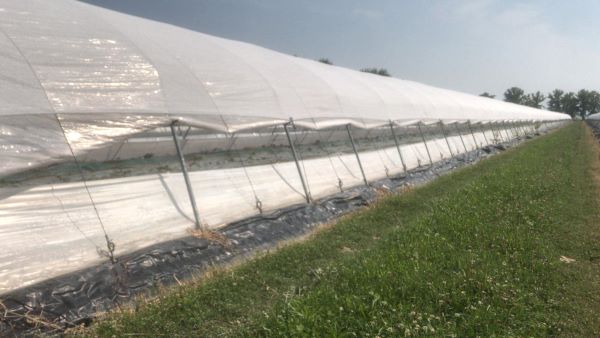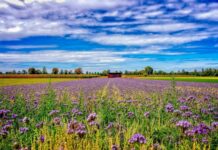Melon and watermelon are today among the most cultivated fruits in the world but, at the same time, professional producers must face various obstacles to obtain satisfactory results, first of all the high summer temperatures and the attacks of parasites, such as aphids. Arrigoni, international leader in the production of agrotextiles for agriculture, offers two innovative solutions, particularly suitable for these two crops: the range of PRISMA® thermo-reflective agrotextiles and BIORETE® insect screens. Field tests conducted with Prisma at an Italian manufacturer shown efficacy in controlling temperature, with a consequent reduction in water consumption and better yield of plants.
High summer temperatures, in particular, represent a problem for those who produce late melons. Prisma®, a range of protective screens that optimize light diffusion while ensuring temperature control, is ideal for controlling temperatures under tunnel. Conducted at “La Palazzina” farm in Gualtieri (RE), specialized in melons, watermelons and pumpkins, Arrigoni field tests shown that these screens allows the production of late melon: thanks to reduced temperatures under cover, this solution proved to reduce enormously melon plants stress during the warmer months. The result was a marked uniformity of plants and therefore in uniform quality and size of fruits, all to the benefit also of the harvesting and selection operations. The reduction in temperature is high, thus compensating for the heat preservation effect due to the non-woven fleece: in fact, this cover is often left on the plants even in early summer until the moment deemed suitable for pollination, with the dual purpose of avoiding the spread of virosis.
In addition, the use of these agrotextiles allows to cultivate without the need to whitewash the plastic film during summer, allowing it to remain transparent for winter cycles. However, whitewash is never perfectly uniform, thus involving the risk of sunburns. Prisma®, on the other hand, is placed on the tunnels and can be easily fixed and removed thanks to the use of specific clips supplied by Arrigoni.
For watermelons, however, one of the biggest threats comes from aphids. For total protection, Arrigoni offers the Biorete Air Plus® range, innovative anti-insect screens with low-thickness and high-resistance monofilament. There are several advantages that this solution ensures: better ventilation with a high level of protection, reduced temperatures inside greenhouses, reduced occurrence of cryptogamic diseases, better fruit setting and plant development, better quality, and sensory properties of fruits.
“An increasingly sustainable agriculture and where water saving plays a central role are the challenges we are facing today,” comments Paolo Arrigoni, managing director of Arrigoni. “The solutions we offer on melon and watermelon, as well as on various other fruit and vegetable crops, go precisely in this direction, reducing the use of chemicals and ensuring a cooler and ideal environment for plants growth. Effectively protected, plants can absorb the most authentic force of nature and with less water consumption”.
Today, the top spot in international melon and watermelon production is firmly in the hands of China, which alone accounts for over 40% of watermelon production and 35% of melon production. At a great distance, Turkey and Iran challenge for the second and third positions of this special ranking, with 2.05% and 2.03% respectively for watermelon and 8.17% and 8.27% for melon. Then, other warm countries follow, all outside Europe, such as Morocco, Egypt, Mexico and Brazil. As for watermelon, Italy occupies just under 0.3% of world production, behind Spain and Greece in Europe. More important, however, is the cultivation of melon, where Italy holds a share of 1.23% and ranks 11th internationally, behind Spain (source: FAO).








